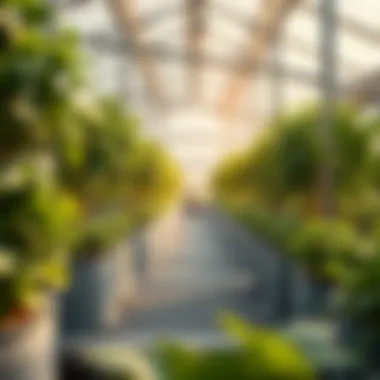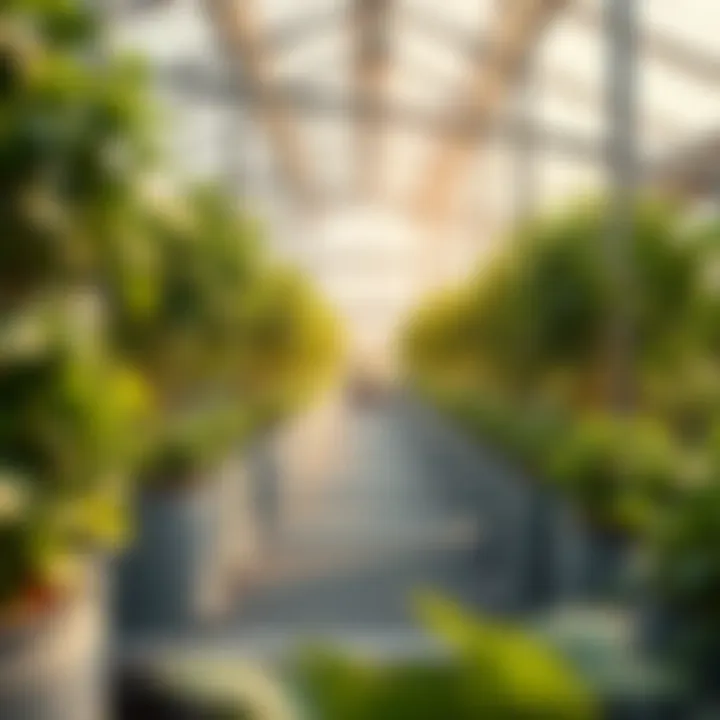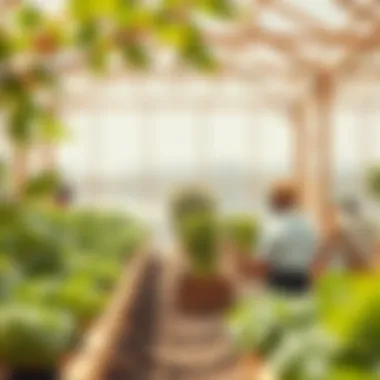Innovative Greenhouse Trends Transforming Deira


Intro
In a city where skyscrapers compete for attention and the desert landscape often feels unforgiving, the rise of greenhouses in Deira signifies a refreshing contrast. This urban area, traditionally bustling with markets and trade, is shifting paradigms by embracing sustainable agricultural practices. The concept of greenhouses is no longer merely confined to rural stretches; it is now on the radar in urban settings, especially in the heart of Dubai.
The trend is more than just another architectural marvel. It embodies a movement towards sustainability and resilience in food production, aiming to bolster the local economy while nurturing a community spirit. With the world grappling with the effects of climate change and resource depletion, the greenhouses in Deira are not just a breath of fresh air; they are a beacon of hope, showing how innovative agriculture can coexist within urban landscapes.
Key points of discussion in this article range from the different types of greenhouses sprouting around Deira to the cutting-edge technologies redefining urban farming. We'll also explore the socio-economic impacts, examine neighborhood profiles, and spotlight community-driven initiatives that showcase the potential of local involvement.
As we journey through this investigation, let's peel back the layers of this urban agriculture revolution, providing a comprehensive understanding of how greenhouses can foster sustainable city development while enhancing food production in one of Dubai's vibrant quarters.
Intro to Greenhouses in Deira
Urban agriculture is gaining remarkable traction in places like Deira, where the hustle and bustle of city life can overshadow the natural beauty of agricultural practices. The introduction of greenhouses in this vibrant district is not merely a trend; it’s a strategic move towards sustainability and food security. In this context, greenhouses become essential not just as structures for growing plants but as catalysts for change, addressing food scarcity and reducing the carbon footprint involved in transporting produce.
The Importance of Urban Agriculture
Urban agriculture brings fresh food closer to consumers, and it provides a unique opportunity for cities to reduce their dependency on external food sources. This is especially crucial in Deira, a district known for its rapid urbanization and diversification. By establishing greenhouses, local communities can cultivate a variety of crops that are tailored to the climate and demand.
Moreover, greenhouses serve as educational platforms, teaching residents about sustainable practices and healthy eating. This can improve not just land use but also community health. Additionally, it can significantly affect the economy by providing jobs in agriculture and related sectors, fostering skills development, and boosting local food production.
Overview of Deira's Growing Urban Landscape
Deira is an area that showcases a unique blend of tradition and modernity, characterized by crowded markets and skyscrapers that touch the sky. As the city continues to grow, so does the pressure on urban spaces, making it vital to find ways to maximize land utilization.
Recent urban planning efforts have shifted towards integrating green spaces within the concrete jungle, leading to a more harmonious living environment. Greenhouses fit well into this narrative.
They utilize available land efficiently and adapt easily to limited spaces, whether on rooftops or in backyards. The concept doesn’t just address food production; it offers aesthetic value, which can enhance property appeal for real estate agents and property developers alike. In a district that attracts many expatriates, having access to fresh, locally produced food can be a significant draw.
Thus, the implementation of greenhouse systems could be the silver lining in Deira’s urban expansion, not only enriching the environment but also reinvigorating local communities. Through these initiatives, the district can truly embrace a sustainable development model.
Types of Greenhouses
Greenhouses come in a variety of shapes and forms, each tailored to cater to specific agricultural needs and environmental conditions. The importance of understanding different types of greenhouses cannot be understated, especially in a bustling urban setting like Deira. As urban agriculture gains momentum, having a clear grasp of these options helps stakeholders make informed decisions about which design will suit their goals best. Not only does the type of greenhouse dictate the kind of crops that can be grown, but it also impacts the overall efficiency, maintenance costs, and integration with existing urban infrastructure.
Traditional Greenhouses
Traditional greenhouses are perhaps the most recognizable. They usually feature a framework of wood or metal, topped with transparent materials like glass or plastic. This design allows sunlight to nourish plants while protecting them from adverse weather. In Deira, where the climate can swing from sweltering heat to occasional rain, traditional greenhouses offer a flexible solution. They provide a controlled environment that minimizes external variables, which is crucial for growing sensitive crops.
The benefits of traditional greenhouses include:
- Accessibility: They can be built in various sizes to fit available plots, from modest urban gardens to larger commercial operations.
- Versatility: These structures can house a wide range of plants, from vegetables to decorative flowers, depending on the desired outcome.
- Longevity: When maintained properly, traditional greenhouses have a considerable lifespan, making them a long-term investment for urban farmers.
However, the initial set-up costs can be steep, and they require regular upkeep, such as cleaning the glass or replacing aged frames, which might deter some potential urban gardeners.
Hydroponic Systems
Hydroponics represents a leap forward in agricultural practices, particularly suited for urban landscapes like Deira. This method involves growing plants without soil, typically in nutrient-rich water solutions. Hydroponic systems are designed to maximize space efficiency and resource conservation, making them ideal for limited urban environments.
Key advantages of hydroponics include:
- Resource Efficiency: Hydroponic systems use up to 90% less water than traditional soil gardening, crucial in a desert climate.
- Faster Growth Rates: Plants often grow quicker in water-based systems due to direct access to nutrients.
- Lower Pest Incidence: Without soil, many pest-related problems are significantly reduced, leading to lower pesticide use.
Despite these merits, prospective growers need to be aware of the complexity and initial investment required for hydroponic setups. The technology demands a level of technical skill for management and maintenance, which might be a barrier for some.
Aeroponics and Its Benefits
Aeroponics takes the concept of soil-less cultivation a step further. In this system, plants grow suspended in the air while their roots are regularly misted with a nutrient-rich solution. This method further conserves water and increases oxygen availability for the roots, leading to robust plant growth. In Deira, where climate challenges exist, aeroponics can be a game-changer.
Benefits of aeroponics include:
- Minimal Water Usage: This system can use as little as 10% of the water required for conventional soil-based methods.
- Space Optimization: Aeroponic systems are often vertical, allowing urban farmers to use small plots effectively.
- Enhanced Nutrient Uptake: The misting technique ensures that plants receive nutrients more effectively, potentially leading to higher yields.
Nevertheless, it requires additional technical knowledge and has higher setup costs than traditional systems, which might make it less accessible for casual gardeners.
In summary, each type of greenhouse presents unique advantages and challenges that can fit well within the urban landscape of Deira. Understanding these differences helps stakeholders strategize effectively to harness urban agriculture's potential.


Technological Advancements in Greenhouses
The concept of greenhouses has dramatically evolved, particularly in urban settings like Deira. Technological advancements play a crucial role in enhancing efficiency, sustainability, and productivity in greenhouse operations. Greenhouses are no longer mere structures for growing plants; they have transformed into high-tech production environments. By incorporating cutting-edge design and technology, urban greenhouse projects can significantly impact food security and environmental sustainability.
Automation in Greenhouse Management
Automation has taken the lead when it comes to managing greenhouse environments. With systems controlling everything from irrigation to lighting, automation minimizes human intervention, reducing the chances of errors while maximizing productivity. These systems use sensors to monitor plant health, soil moisture, and environmental conditions. For instance, a grower might utilize a smartphone app to receive alerts when humidity levels drop below optimal thresholds, enabling timely corrective actions.
Moreover, automated systems can operate on set schedules or adapt in real-time to changing conditions. This not only improves operational efficiency but also lowers labor costs. A well-designed automated greenhouse allows for precise resource management, ensuring water and nutrients are used judiciously, which is crucial in a resource-constrained area like Deira.
Climate Control Technologies
A greenhouse is only as good as how well it can manage its internal climate. Climate control technologies have become indispensable in achieving optimal growth conditions for plants. These technologies cover various aspects, including temperature, humidity, and ventilation.
For example, a modern greenhouse might employ advanced HVAC systems designed to maintain climate stability with minimal energy consumption. Such systems can also be enhanced with sophisticated sensors that provide real-time data, allowing for immediate adjustments. Furthermore, the integration of thermostats connected to cloud-based platforms means remote monitoring and fine-tuning are feasible. In Deira's hot climate, effective climate control reduces stress on plants and enhances crop yields, ensuring that urban gardeners can turn out high-quality produce all year round.
Use of Renewable Energy Sources
The push for sustainability is where renewable energy sources come into play. Greenhouses can greatly benefit from the adoption of solar or wind energy, particularly given Deira's sunny disposition. By harnessing solar panels on greenhouse roofs, growers can significantly reduce their dependency on conventional power sources. This not only lowers operational costs but also aligns with global sustainability goals.
Utilizing renewable energy in greenhouse operations can lead to energy independence. For instance, excess energy generated during peak sunlight hours can be stored or redirected to power related facilities, such as aquaponics systems or energy-efficient lighting. This interconnected approach makes greenhouses more resilient and less vulnerable to the fluctuations of energy markets.
"The future of urban agriculture lies in technology, innovation, and sustainability. Greenhouses equipped with automation and renewable energy are the stepping stones toward a self-sufficient city."
For further reading on greenhouse technology, you can visit resources like Wikipedia or Britannica.
Related Categories
- Urban Agriculture
- Sustainable Development
- Smart Technologies
Economic Implications of Greenhouses
The rise of greenhouse establishments in Deira brings significant economic implications that extend beyond just food production. This section delves into how greenhouses can act as catalysts for local economic growth, job creation, and sustainable business practices that align with contemporary market demands.
Boosting Local Employment
With the establishment of greenhouses comes the direct impact on local job markets. These facilities require a range of skilled and unskilled labor—from agricultural engineers to general laborers. As urban agriculture gains traction, it is likely to create numerous job opportunities. For instance, positions such as greenhouse managers, horticulturists, and technicians can emerge alongside traditional roles like farmhands. This new wave of employment not only bolsters the local economy but also allows for the development of vocational training programs tailored to equip residents with skills essential for the greenhouse sector.
Neighborhoods that embrace greenhouses may witness a revitalization of their economies as workers could engage in roles that promote self-sufficiency and food security. Local businesses supporting greenhouse operations—such as suppliers of seeds, fertilizers, and biopesticides—could also flourish alongside this trend. By hiring locally, these greenhouses foster a sense of community and pride while mitigating unemployment challenges.
Sustainable Business Models
Greenhouses are redefining the business landscape in Deira with innovative, sustainable models aimed at reducing ecological footprints while maximizing productivity. The farm-to-table movement resonates with consumers increasingly inclined towards eco-friendly practices. This cultural shift prompts businesses to adopt organic growing methods, thereby appealing to a conscientious clientele. Furthermore, sustainable practices, such as rainwater harvesting and solar energy adoption, can significantly reduce operational costs in the long run.
Many successful initiatives showcase business models where profit margins are enhanced through local collaborations with restaurants, grocery stores, and community-supported agriculture programs. By prioritizing sustainability, greenhouse businesses not only meet market demands but also contribute to broader environmental goals, reinforcing their role as innovators in urban agriculture.
Market Demand for Locally Sourced Produce
A noticeable trend in the UAE's culinary scene is the growing demand for locally sourced produce. Consumers have become more aware of the benefits of fresh ingredients, and greenhouses play a crucial role in meeting this demand. Shortening the supply chains by providing fresh vegetables and fruits from local greenhouses helps in reducing transportation emissions.
Local supermarkets and restaurants are now actively seeking partnerships with greenhouse producers to ensure a steady supply of fresh produce, which in turn enhances their offerings. This trend not only supports local economies but also encourages sustainable consumption patterns—consumers feel more connected to their food sources.
The effects of this market demand lead to a ripple effect; farmers can command better prices for high-quality produce while customers enjoy fresher options. It's a win-win arrangement that highlights the importance of local agriculture in urban settings, indicating a prosperous future for greenhouse ventures in Deira.
"Greenhouses in urban areas not only provide fresh produce but also nurture economic growth and community resilience."
Environmental Considerations
Understanding the environmental considerations surrounding greenhouses in Deira is paramount, especially as urban areas grapple with the effects of climate change and rapid population growth. Greenhouses not only serve as a means of food production but also contribute to the overall health of the ecosystem within which they operate. By focusing on elements such as urban heat reduction, improved air quality, and fostering biodiversity, we can see how these structures fit into the larger puzzle of sustainable urban living.
Reducing Urban Heat Islands
The phenomenon known as urban heat islands occurs when urban or metropolitan areas become significantly warmer than their rural surroundings. This rise in temperature can be attributed to human activities and the vast expanses of heat-absorbing materials such as asphalt and concrete. Greenhouses, with their plants, can help alleviate this effect.
Plants provide shade, which can cool the surrounding area. Furthermore, through the process of transpiration, where plants release water vapor, they contribute to lowering ambient temperatures. By incorporating green spaces like greenhouses into urban planning, Deira can cool its streets, potentially reducing air conditioning costs and energy consumption.
Improving Air Quality


Greenhouses can also play a crucial role in enhancing urban air quality, acting as a natural filter for pollutants. The vegetation within these structures absorbs carbon dioxide—a major contributor to greenhouse gas emissions—and releases oxygen back into the atmosphere. For cities like Deira, experiencing increased vehicular traffic and industrial activities, this is vital.
The specific choice of plants can further impact air quality positively. Many species are excellent at sequestering harmful airborne pollutants. Maintaining a diverse array of plant life in greenhouses ensures that air purification is maximized, benefitting the local community and creating a healthier living environment.
"From the city streets to the fridge, greenhouses act as a bridge, nurturing not just the crops but the very air we breathe."
Biodiversity Benefits
Biodiversity is important for the stability of ecosystems. Greenhouses can help enhance urban biodiversity by providing habitats for various organisms, from insects to small mammals. This is especially significant in a city like Deira, where urban sprawl can limit natural habitats. By cultivating a variety of plants, greenhouses can attract pollinators, which are essential for many agricultural crops worldwide.
Not only do greenhouses support the existing flora and fauna, but they can also serve as educational hubs, showcasing the importance of biodiversity to local communities. Encouraging the growth of native plants can help restore balance to the ecosystem, creating a sense of harmony with nature in urban settings.
In summary, the integration of greenhouses into Deira's urban environment presents numerous environmental benefits—ranging from mitigating urban heat effects to improving the air quality and promoting biodiversity. As more residents realize these advantages, the potential for urban agriculture to transform Deira into a greener, healthier city becomes increasingly tangible.
Case Studies of Successful Greenhouses in Deira
Understanding successful greenhouse projects in Deira offers valuable insights into the potential these initiatives hold for urban settings. Such case studies reveal not just the method and innovation involved, but also highlight the tangible benefits these structures provide to the community and environment. Through examining specific examples, it becomes clear how greenhouses can redefine urban agriculture, foster community collaboration, and promote sustainability.
Community-Driven Initiatives
Community-driven greenhouse projects have been sprouting up in Deira as resonate symbols of local empowerment and environmental stewardship. These initiatives often emerge from grassroots movements, where local residents unite under a shared goal of enhancing urban food production while fostering community spirit.
An example worth noting is the Al Ain Community Garden, where residents converted a previously barren plot into a vibrant greenhouse. This project not only teaches members how to grow their own vegetables but also promotes healthy eating habits among families. With workshops covering everything from soil health to harvesting techniques, the initiative serves dual purposes: it cultivates a sense of belonging and empowers people with self-sufficiency skills in food production.
Furthermore, community involvement leads to the creation of diverse food systems. One such project, known as the Deira Urban Farming Collective, encourages families to participate in communal planting days. This gathering cultivates not just plants but connections among neighbors, reinforcing social ties through shared responsibility.
Such initiatives also provide a practical avenue for education. Engaging workshops tailored for both adults and children proliferate knowledge about sustainability practices, which is crucial in a rapidly urbanizing environment. With programs focused on organic farming practices, participants learn the value of cultivating food without harmful chemicals, which enhances both personal and environmental health.
"It’s not just about growing food; it’s about growing community, one seed at a time."
Corporate Greenhouse Projects
On the other side of the coin, corporate greenhouse projects are shaping the agricultural landscape of Deira by leveraging technology, resources, and funding that many community-driven initiatives often lack. Companies, recognizing the growing market for locally sourced produce, are investing in greenhouse complexes that can efficiently yield high volumes of crops.
A notable example is the partnership between Dubai Investments and a local agritech firm that constructed a state-of-the-art greenhouse facility in Deira. By utilizing hydroponic systems, they can produce large quantities of leafy greens year-round while conserving water—a critical resource in arid environments.
These corporations often incorporate a range of technological advancements, including climate control and automated watering systems, ensuring optimal growth conditions for plants. Such projects not only address food supply chain vulnerabilities but also position their companies as sustainable and socially responsible entities.
Moreover, corporate greenhouses are beginning to participate in community outreach as part of their corporate social responsibility strategies. They offer educational programs aimed at local schools, providing students with hands-on experiences related to urban agriculture and sustainability. This not only is an effective marketing tool but also fosters a future generation of eco-conscious individuals.
Corporate greenhouses can thus serve as critical hubs for knowledge exchange, innovation, and employment opportunities, bridging the gap between business objectives and community needs.
Community Involvement and Education
Engaging the community in greenhouse initiatives plays a crucial role in shaping sustainable urban agriculture in Deira. The focus is not just on growing plants but also cultivating a spirit of collaboration and shared learning. When local residents participate in greenhouse activities, they not only gain practical skills but also foster a sense of ownership over their food sources. This engagement can significantly enhance food security in the area, creating a cycle of production and consumption that is rooted in community values.
Moreover, educating local communities about the importance of self-sufficiency in food production can have profound implications for their lifestyle choices. With the ever-increasing reliance on imported goods, local involvement in agriculture encourages residents to turn their eyes towards what can be achieved at home, reducing their carbon footprint and reliance on external supply chains. It’s a win-win situation where both the environment and the community benefit from informed practices.
Workshops and Training Programs
Organizing workshops and training programs is an effective way to bridge knowledge gaps and spread awareness about greenhouse operations. Local experts and agriculturalists can lead sessions that cover topics such as sustainable practices, plant care, pest management, and advanced growing techniques. In this setting, participants learn through hands-on experience, which tends to be more impactful than traditional classroom settings.
When residents come together for workshops, they not only learn but also network, sharing techniques and ideas that might work best in their backyards or community spaces. In Deira, an increasing number of community centers and local groups are taking initiative by hosting these programs, ensuring that information is accessible to all, including those without prior experience in agriculture.
- Benefits of Workshops:
- Hands-on learning experience.
- Networking opportunities with local farmers.
- Practical skills that can be directly applied in gardens and greenhouses.
- Increased awareness of environmental sustainability.
School Projects and Collaborations
Integrating greenhouse concepts into educational curriculums can spark a passion for sustainability in younger generations. School projects and collaborations can take the form of gardens managed by students or partnerships with local farmers to create educational experiences that resonate with the youth in Deira. These initiatives can serve as interactive classrooms that teach not only the science of agriculture but also important life skills such as responsibility, teamwork, and environmental stewardship.
In some cases, schools collaborate with greenhouse operators in practical endeavors. Students can participate in the design and maintenance of greenhouses, providing them with a firsthand understanding of urban farming.
Additional Elements of School Collaborations:
- Field Trips to Local Greenhouses: Students get to see working examples of what they've learned in theory.
- Project-Based Learning: Schools can develop projects that can turn into real-life contributions to local wellness.


These engagements instill a sense of pride in the community and illustrate the immediate impacts of their efforts on food systems and sustainability practices.
The synergy between community involvement and education is vital. By equipping residents with knowledge and hands-on skills, we can cultivate not just plants, but also a robust community that champions sustainability in every corner of Deira.
Challenges Faced in Establishing Greenhouses
Setting up greenhouses in Deira is not just about tilting the earth and planting seeds. There are several hurdles that prospective greenhouse owners must address. Challenges can range from regulatory issues to water scarcity, each of which plays a significant role in the success or failure of these endeavors. Understanding these challenges is crucial, especially when considering the potential benefits of greenhouses as a means of enhancing local food production and promoting sustainable urban living.
Land Use Regulations
Navigating land use regulations may feel akin to walking through a maze blindfolded. In Deira, land is a precious commodity, and zoning laws can be quite complex. These regulations dictate where greenhouses can be established and under what conditions. Potential greenhouse owners might encounter restrictions on land usage that can make or break their projects.
When considering establishing a greenhouse in Deira, one must be aware of several key points:
- Zoning Laws: Specific areas may be designated for commercial or residential use only, affecting where agricultural practices can occur. Understanding these zones is crucial for compliance and operational continuity.
- Permitting Process: Securing the necessary permits can be an arduous task. Often, it requires multiple submissions and approvals from various government bodies. Being prepared to navigate this bureaucratic landscape can save time and resources.
- Environmental Considerations: Regulations are often influenced by environmental assessments. Establishing a greenhouse may necessitate studies on local biodiversity, requiring an understanding of how planting will affect local ecosystems.
If these elements are not meticulously addressed, the vision of a flourishing greenhouse may quickly turn into a legal nightmare.
Successful greenhouse initiatives often rely on a clear understanding of local regulations and robust community engagement to foster support.
Water Resource Management
Water scarcity presents another pressing obstacle for greenhouse developers in Deira. In an area known for its arid climate, effective water resource management isn’t just important; it’s critical for survival. Greenhouse operations demand efficient water usage to maintain optimal growing conditions while also prioritizing sustainability.
Key considerations include:
- Irrigation Techniques: The choice between drip irrigation, which minimizes water waste, and other conventional methods can greatly influence the sustainability of a greenhouse. Implementing modern irrigation techniques is essential for responsible water use.
- Water Sources: Identifying reliable water sources is vital. Relying solely on desalinated water can be cost-prohibitive and unsustainable in the long run. Exploring rainwater harvesting or utilizing treated wastewater may offer more viable alternatives.
- Education on Conservation: Raising awareness about the importance of water conservation among staff and community members can foster a culture of sustainability.
In summary, tackling these challenges head-on is essential for establishing successful greenhouses in Deira. Each obstacle presents its own set of complexities, yet overcoming them can lead to significant rewards in urban agriculture and sustainable development. For those considering such a venture, an upfront investment in understanding and addressing these challenges is not merely advisable, it's foundational.
The Future of Greenhouses in Urban Settings
The potential of greenhouses in urban areas is vast and multifaceted. As cities swell and resources become strained, it becomes increasingly clear that integrating greenhouses into our urban fabric is not just beneficial: it's essential. This section delves into why urban greenhouses are crucial for the cities of tomorrow, particularly in a dynamic market like Deira.
Trends in Urban Agriculture
Urban agriculture has gained substantial traction in recent years. People are not only interested in locally sourced produce but also in engaging with the food they consume. Here are some noteworthy trends:
- Community Gardens: These are sprouting up faster than weeds. Local residents join hands, cultivating vegetables and herbs—a way to reconnect with nature amidst concrete.
- Vertical Farming: Space is a premium in Deira. Vertical farms stack layers of crops on top of one another, maximizing production while using less land. It’s a neat trick to make city living greener.
- Organic Growing Practices: More folks are becoming conscious of what goes on their plates. Organic practices not only provide healthier options but also foster a sustainable environment.
- Farmers’ Markets: Local markets that feature produce from urban greenhouses promote awareness and encourage healthy eating habits. They provide a direct line between growers and consumers, making it feel personal.
By embracing these trends, Deira can enhance its community’s engagement with agriculture, promoting sustainability and local economies at the same time.
Integrating Smart Technologies
As we look ahead to the future, the integration of smart technologies into greenhouse operations stands out.
- IoT Sensors: These allow real-time monitoring of conditions within the greenhouse, ensuring optimal growth environments for plants. Temperature, humidity, and soil moisture can be controlled remotely, reducing the need for constant supervision.
- Data Analytics: Advanced analytics can predict plant growth patterns and potential pest infestations. By analyzing historical data, operators can fine-tune their practices for better yields.
- Automated Irrigation Systems: Efficient water usage is a must in arid areas. Smart irrigation systems assess moisture levels and apply water precisely when needed, downgrading waste significantly.
- Artificial Intelligence in Farming: AI technologies can optimize planting schedules and harvest times by evaluating weather patterns and soil conditions, reducing labor costs while enhancing productivity.
Integrating these smart technologies into Deira’s greenhouses not only increases the efficiency of farming but also serves a critical role in cultivating an innovative urban agricultural scene.
"The future depends on what you do today." — Mahatma Gandhi. The moves made today in Deira’s greenhouses will shape tomorrow’s urban landscape.
With this understanding, stakeholders—from real estate agents to local investors and community members—must engage in the conversation around urban greenhouses. The aim is to establish a sustainable system that not only feeds the growing population but also enriches the local environment and economy.
Ending
As we wrap up this exploration into greenhouses in Deira, it becomes crystal clear that these structures are not just a passing trend but rather an integral part of the future of urban agriculture. Greenhouses offer a myriad of benefits that extend beyond mere food production; they contribute to the sustainability of the environment, uplift local economies and foster community spirit.
Summary of Key Takeaways
Reflecting on the previous sections, the key takeaways about greenhouses in Deira are numerous. First and foremost, these greenhouses play a vital role in promoting urban agriculture, ultimately leading to increased food security in bustling metropolitan areas. They harness various technologies—from traditional setups to advanced hydroponic systems—that significantly enhance crop yield and resource efficiency.
Additionally, it’s evident that community involvement in greenhouse initiatives not only educates the public about sustainable practices but also encourages local investment and experiential learning. In a rapidly urbanizing landscape like Deira, the integration of these practices can help combat urban sprawl’s adverse effects, while also connecting people back to their food sources and enlightening them on environmental responsibilities.
Then there are the economic implications; establishing greenhouses can create jobs, support small businesses, and drive local economies forward. Residents have seen benefits firsthand, enjoying fresher produce while fostering a collective sense of ownership and pride in community initiatives. While challenges like land use regulations and water resource management exist, they are being confronted with innovative solutions.
To put it simply: greenhouses represent an intersection of tradition and innovation, providing a clear path for urban landscapes to adapt and thrive in the face of change.
The Role of Greenhouses in Sustainable Urban Development
When considering the overarching theme of sustainable urban development, greenhouses emerge not just as tools for farming but as valuable assets for entire communities. Their ability to improve air quality and reduce urban heat islands is a significant asset in densely populated areas like Deira. They play a critical role in fostering biodiversity amidst the concrete sprawl, creating pockets of green that serve a plethora of ecological functions.
Moreover, as the world pivots towards more sustainable practices, greenhouses can serve as models of efficiency, incorporating renewable energy technologies such as solar power and rainwater collection systems, which can drastically cut down on resource consumption. This makes them a beacon for future urban planning, guiding developments toward eco-friendly practices.



